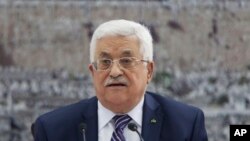RAMALLAH, WEST BANK —
Palestinian president Mahmoud Abbas said on Saturday he was still ready to extend stalled peace talks with Israel, as long as it met his long-standing demands to free prisoners and halt building on occupied land.
Israel suspended the troubled, U.S.-sponsored negotiations with Abbas on Thursday after he signed a unity pact with rival Islamist group Hamas - a movement which has sworn to destroy Israel.
Commentators said the discussions had already hit a brick wall and the United States had been struggling to extend them beyond an original April 29 deadline for a peace accord.
Abbas, for the first time since the suspension, said he was still open to re-starting the talks and pushing on beyond the deadline. There was no immediate response from Israeli negotiators.
“How can we restart the talks? There's no obstacle to us restarting the talks, but the 30 prisoners need to be released,” Abbas told a meeting of senior leaders in the Palestine Liberation Organization at his presidential headquarters in the occupied West Bank city of Ramallah.
“On the table we will present our map, for 3 months we'll discuss our map. In that period, until the map is agreed upon, all settlement activity must cease completely,” he told the officials, who were gathered for a two-day conference to asses the Palestinian strategy to achieve statehood.
Talks veered toward collapse after Israel failed to release a final group of Palestinian prisoners it had pledged to free in March, and after Abbas signed several international treaties - a move that Israel said was a unilateral move towards statehood.
Palestinians accused Israel of not focusing enough during the last nine months of negotiations on drawing future borders between Israel and the future state of Palestine, and they denounced the expansion of Jewish settlements on occupied land.
Israel accuses Abbas of being more interested in healing the national rift with Hamas than achieving a peace deal.
Israel suspended the troubled, U.S.-sponsored negotiations with Abbas on Thursday after he signed a unity pact with rival Islamist group Hamas - a movement which has sworn to destroy Israel.
Commentators said the discussions had already hit a brick wall and the United States had been struggling to extend them beyond an original April 29 deadline for a peace accord.
Abbas, for the first time since the suspension, said he was still open to re-starting the talks and pushing on beyond the deadline. There was no immediate response from Israeli negotiators.
“How can we restart the talks? There's no obstacle to us restarting the talks, but the 30 prisoners need to be released,” Abbas told a meeting of senior leaders in the Palestine Liberation Organization at his presidential headquarters in the occupied West Bank city of Ramallah.
“On the table we will present our map, for 3 months we'll discuss our map. In that period, until the map is agreed upon, all settlement activity must cease completely,” he told the officials, who were gathered for a two-day conference to asses the Palestinian strategy to achieve statehood.
Talks veered toward collapse after Israel failed to release a final group of Palestinian prisoners it had pledged to free in March, and after Abbas signed several international treaties - a move that Israel said was a unilateral move towards statehood.
Palestinians accused Israel of not focusing enough during the last nine months of negotiations on drawing future borders between Israel and the future state of Palestine, and they denounced the expansion of Jewish settlements on occupied land.
Israel accuses Abbas of being more interested in healing the national rift with Hamas than achieving a peace deal.











